Cornwall Hospice Care
Mount Edgcumbe Hospice St Julia’s Hospice Caring for our community
What do I do now?
A guide to help with practical and emotional issues around death and bereavement

Contents A Message from the team at Cornwall Hospice Care .................... 1 Information for bereaved relatives and friends 2 What to do first 3 Medical Certificate of the Cause of Death (MCCD) 4 A Coroner’s authorisation 5 A Coroner’s post mortem 6 Registering the death 7 Tell Us Once service 9 Funeral arrangements ................................................................................................. 10 After the funeral 12 Grief 13 Other people you may need to inform 16 Useful contact details 18 Cornwall Hospice Care 19
A message from the team at Cornwall Hospice Care
We would like to express our heartfelt condolences and deepest sympathy to you, your family and friends during this very sad time. We understand that the time ahead may be difficult for you and we would like to offer our support.
This booklet has been provided to try and help you deal with some of the practical and emotional aspects of losing someone that you love.
1
Information for
bereaved relatives and friends on what to do and who can help
This is often a very difficult and confusing time. This booklet aims to provide some useful help and advice as you navigate the next few days, weeks and months.
There are a number of practical issues that need to be dealt with after someone dies.
2
What to do first
Please remember that any member of the hospice staff will provide guidance and support.
1. Collecting property
Any property and valuables belonging to your relative or friend will be dealt with by the nursing staff. You can ring the ward first to ensure everything is available for collection. We will keep it safely until you are able to collect.
Tel: 01736 759070 - St. Julia’s.
Tel: 01726 65711 - Mount Edgcumbe.
2. The Medical Certificate of Cause of Death (MCCD)
The Medical Certificate is an important document that we will email to the Registrar. The document will be completed by the Hospice Doctor as soon as possible and this must be done within 5 working days. Once the MCCD has reached the Registrar you will be able to telephone the Registrar’s office to make an appointment to register the death.
Please note, a death cannot be registered without a Medical Certificate of Cause of Death.
The Medical Examiner’s Office will also call you to explain next steps and confirm the wording on the Death Certificate. They will also ask whether you have any concerns with any aspects of care.
3
Medical Certificate of the Cause of Death (MCCD)
The Medical Certificate of the Cause of Death (MCCD) has to be issued by a doctor who has seen your loved one at some point in the two weeks before their death.
The Doctor completes the certificate and this will be emailed directly to the Registrar’s office, ahead of your appointment for the death to be registered. You should call the Registrar in Truro to make an appointment and they will try and make an appointment close to your home.
4
A Coroner’s authorisation
If the cause of death is not clear, or where there is concern about the potential of a work related disease being involved, a Doctor cannot issue a Medical Certificate of the Cause of Death (MCCD) without consulting the Coroner.
Sometimes, if a death is referred to the Coroner, a police officer working for the Coroner will need to contact you to prepare a report relating to your loved one’s medical history. This is standard procedure. They may make contact with you by phone or visit you at home to talk through what had been happening to your loved one before they died.
In certain circumstances the Coroner may authorise the doctor to issue a Medical Certificate of the Cause of Death (MCCD) with written clearance from the Coroner without the need for any other investigations.
A death may not be registered until the Registrar has received written clearance from the Coroner. It is the Coroner’s duty to ensure that there is a clear understanding around the cause of death. If there is any doubt a Coroner may decide that a post mortem (examination to determine the cause of death) is required.
Please do not hesitate to ask the Cornwall Hospice Care team about anything that is unclear.
01726 65711 St
01736 759070
Edgcumbe Hospice
Mount
Julia’s Hospice
5
A Coroner’s post mortem
The Coroner may decide that a post mortem is required to establish the cause of death. If this is the case your consent is not needed. You will be informed of the decision but cannot stop the post mortem being conducted.
Once the post mortem has been completed, you will receive a letter asking you to register the death. The Coroner will send the Medical Certificate of the Cause of Death (MCCD) directly to the Registrar. This process usually takes a few days.
6
Registering the death
Until the death has been registered the deceased cannot be moved out of the area. Arrangements can be made to register a death elsewhere. The MCCD is still emailed to the local Registrar. You will need to inform the Registry Office in Truro to let them know that you wish to register the death out of the County and they can arrange this for you. This may delay the funeral by a few days because the forms have to be posted to the office where you wish to register. (The MCCD is emailed to the Registrar and the Registrar is responsible for it reaching an out of County register office).
Should you live outside of Cornwall, you can register the death remotely via a process called Declaration. Please ask the Registration Information Service for more information on how to do so.
This is a legal responsibility and should usually be done within five days of the death unless the Coroner is investigating the circumstances around the death.
Any official documents, ie. birth certificate, medical card etc. will be helpful to have at the meeting.
Who can register a death?
• A relative of the deceased
• A person present at the death
• The occupier of the premises where the death occurred if she/he knew of it happening
• The person arranging the funeral - this does not have to be a funeral director, but may be
7
What will the Registrar ask me?
The Registrar will ask you a number of questions in a private room. These will include:
• The date and place of death
• The full name, surname and maiden surname if the person who has died was married
• The date and place of birth of the deceased
• The occupation of the deceased and if the deceased person was married the full name and occupation of the spouse and if retired
• The usual address of the deceased
• If the person who has died was married, the date of birth of the surviving spouse
• Whether the person who has died was receiving a pension from public funds
The Registrar will enter all these details into a computer and will give you an opportunity to check that they are correct. This is a legal record and you should be sure you are happy with the information entered as mistakes discovered later can be very difficult to correct. The information will then be saved onto the electronic register and you will be given a copy of the entry. Further signed copies can be purchased for a fee. It can be a good idea to get extra certified copies, as they will be needed by banks, insurance companies etc.
At the same time you will be given a “green form” which enables you to arrange the funeral (if the Coroner is involved different procedures may apply). You will also receive a form to complete around benefits.
8
‘Tell Us Once’ service
The Registrar will give you information about the Tell Us Once service when you go to register the death.
You can also find further information from the Registrar or at www.gov.uk/tell-us-once
Tell Us Once brings together several organisations (see the list below) so that you do not need to notify them individually.
Tell Us Once links information between:
• Department for Work and Pensions (DWP)
• HM Revenue and Customs (HMRC)
• Local Authorities
• Driving and Vehicle Licensing Agency (DVLA)
• Identity and Passport Service (IPS)
9
Funeral arrangements
Contact a Funeral Director
You do not have to wait until the Medical Certificate of the Cause of Death (MCCD) has been issued to make contact with a funeral director. You should take time before making a decision about using a funeral director, comparing services offered and likely costs. Funeral directors available should clearly present all costs and services and answer any questions about burial or cremation you may have.
The funeral director of your choice will advise you of the options and discuss with you the arrangements you wish to make. The funeral is your opportunity to say your goodbyes in a way that is appropriate both for you and the person who has died. It is important not to feel rushed. You may wish to choose who might lead the service (not necessarily a Minister of Religion), certain music or readings, and you or other relatives or friends may wish to take part in the service.
The funeral director will make arrangements to collect and look after your loved one with the Hospice team.
10
Paying for the funeral
Funeral costs are normally recoverable from the deceased’s estate, but the person organising the funeral will be responsible for paying the bill. It is advisable to check where the money will come from before you make arrangements. Many people now purchase their funeral in advance through a pre-purchase funeral plan. You may need to check if this has been arranged.
Many funeral directors require payment before probate is granted, so ensure you discuss payment from an early stage. Where probate is being requested, many banks and building societies will release money to pay for the funeral before probate is granted but not all.
If you are having difficulty paying for a funeral, you may be entitled to help with the funeral costs through the Social Fund. There is now a one-stop contact number at the Department for Work and Pensions (DWP) (0800 731 0469) which will cancel all DWP benefits, as well as help you establish if you are eligible for help towards costs (a funeral grant) and advise on your eligibility for other benefits. There is a time limit for claiming bereavement benefits and a funeral grant so it is important to contact them as soon as possible. Funeral grants have a maximum threshold and not everyone is given the full amount. It is essential to consider this when organising the funeral to prevent running up large costs.
In some cases, when there are no funds to pay for the funeral, the local authority may help. Please discuss this with the Hospice team who will help you make arrangements. It is important that you contact them before the funeral has been arranged.
11
After the funeral
Settling the deceased person’s estate can be confusing, time consuming and distressing. If you have been named Executor in the Will, you will have responsibility for carrying out the person’s wishes. This will include ensuring that further expenses, debts and taxes are paid from the deceased person’s estate. It will also mean arranging possessions and other assets to be disposed of appropriately and in accordance with the deceased person’s Will (if they have one).
12
Grief: When someone dies
Looking after yourself
The death of someone you love can be a devastating experience, often causing stronger emotions than most people have ever felt before.
Feelings
Even if you knew your loved one was dying, there is still a sense of shock when the death occurs. You may feel cold, numb, empty and unreal for a time. Following this you may experience such emotions as anger, panic, guilt and sadness. This may also be accompanied by periods of restlessness, especially at night when it may be difficult for you to sleep. You may also become irritable or critical of yourself and others, or feel unable to attend to routine matters or to think straight, which can lead to feelings of dispair. All these are natural reactions to bereavement and are not a sign that you cannot cope any more.
Grief is a very individual process and we each react differently. What is important is that you allow yourself time to grieve and to come to terms with your loss, in the way that is right for you.
Support
Cornwall Hospice Care will contact you at 6-8 weeks following your loss to see how you are, however please contact us sooner if you feel you may require support sooner.
During this time you may need extra support. Do not be afraid to speak about your feelings to someone. Other people may be afraid to speak about your loved one for fear of upsetting you. You may need to let them know when you want to talk. Tears are a natural way of releasing emotions; do not be embarrassed by them.
13
There are also various organisations locally who can offer further support and counselling for you. Some of these are listed on our website. If you are not sure please speak to a professional about what is happening to you.
Some people may feel unable to grieve after a death; perhaps because they are caring for someone else and feel that they ‘have to be strong’. The grief may then be released when a subsequent loss or event occurs, which may even be relatively minor, but is the trigger for emotions to be expressed. Sometimes this can be many years after the original loss.
Hospice staff are more than willing to spend time with you and will try and support you. Our Sanctuary is always open for quiet reflection and we can arrange for a member of our hospice clinical team to see you.
It is wise to avoid making hasty decisions about the future.
Talking to children about death
Adults often feel the need to protect children from death. They may feel children will not understand or that they will be too upset. However, we can often underestimate a child’s resources and ability to cope. Children often find it harder if they are not told what is happening, because they may be frightened by imagined events. Children should be told the facts in a simple manner, using appropriate words e.g. ‘dead’, ‘death’, rather than ‘lost’ or ‘asleep’. Give them time to ask questions (which may be very direct) and offer plenty of reassurance.
It is helpful for adults to share feelings with children, such as feelings of sadness. By doing this they learn that it is natural to feel sad when someone dies. Children may like to draw pictures as part of their way of saying goodbye.
14
There are lots of helpful books available to gently support your discussion, please contact the hospice if we can be of any help. You can also make use of our useful links directory which is www.cornwallhospicecare.co.uk/our-care/ usefulinksdirectory/
This directory gives all local and national organisations who can offer you help in one handy place.
You can also find help and support at Penhaligon’s Friends,a Cornish charity supporting bereaved children, young people, parents and carers throughout Cornwall. Please visit www.penhaligonsfriends.org.uk
15
Other people you may need to inform
There are various people who need to be informed of the death and it may be useful to use these checklists to guide you:
People to inform
Employer
Banks/Building Societies/ Credit Card Companies
Insurance: Life insurance
Companies: Car insurance
Property insurance
Mortgage company/Land Registry
Housing Association/Landlord
Social Services – if involved
Family Doctor
Relevant Hospital Doctors
Utility providers – gas, water etc.
School/College – if applicable
National Savings and Investments
Store cards
Telephone company inc mobile
Union/Professional organisations
Stopping Junk Mail
www.stopmail.co.uk
16
Contacted Completed
Care/household service: home help, meals on wheels, cleaner etc
Newspapers
Redirect mail if required
Milk if delivered
Magazine subscriptions
Medicines back to Pharmacy
Driving licence returned to DVLA
Library books
Any equipment borrowed from Hospice – commode, walking sticks etc
Passport returned to passport agency
Season tickets/concessionary travel documents – bus pass to relevant company
Disabled parking (Blue Badge)
Contacted
17
Things to cancel
Returned Items to return
Useful contacts
www.cornwallhospice.co.uk/our-communityservices/
Cornwall Hospice Care’s Community Services Team
Offering bereavement support, information and listening.
01726 829 874
WAY Widowed & Young
Helps the under fifties who have lost a partner.
www.widowedandyoung.org.uk
Reference: Mount Edgcumbe Hospice / St Julia’s Hospice Bereavement Support Book
Publication date: Aug 2023
Review date: Aug 2025
18
Registered Charity Number 1113140
www.cornwallhospicecare.co.uk

Mount Edgcumbe Hospice
01726 65711
St Julia’s Hospice
01736 759070
Cornwall Hospice Care is a charity providing palliative care for people living in Cornwall. Our purpose is to provide compassionate, specialised end of life care for patients, their families and carers, whilst guaranteeing our high-quality standards. Together with our local community in Cornwall, we will continue to make everyday matter.
19

The Hospice would like to thank RNS Publications for publishing this information and the following pages contain some features from services o ering their help at this time.
Whilst the Hospice is grateful of their support it does not endorse or recommend any of the services that they provide.
It is distressing to deal with a bereavement and unsolicited mail can be insensitive and destructive during a grieving process.
By scanning the below QR code on your phone or visiting www.stopmail.co.uk, we are able to securely share this information with mailing organisations and under the Data Protection Act the information will not be used for any other purpose.

Other benefits reduce the possibility of identity fraud, such as assumed identity and you will only have to supply the information once.

�\\ bereavement ,�port network stopping mail STOPPING JUNK MAIL
www.stopmail.co.uk 0808 168 9607 from a landline 0333 006 8114 from a mobile © Bereavement Support Network Ltd 2023
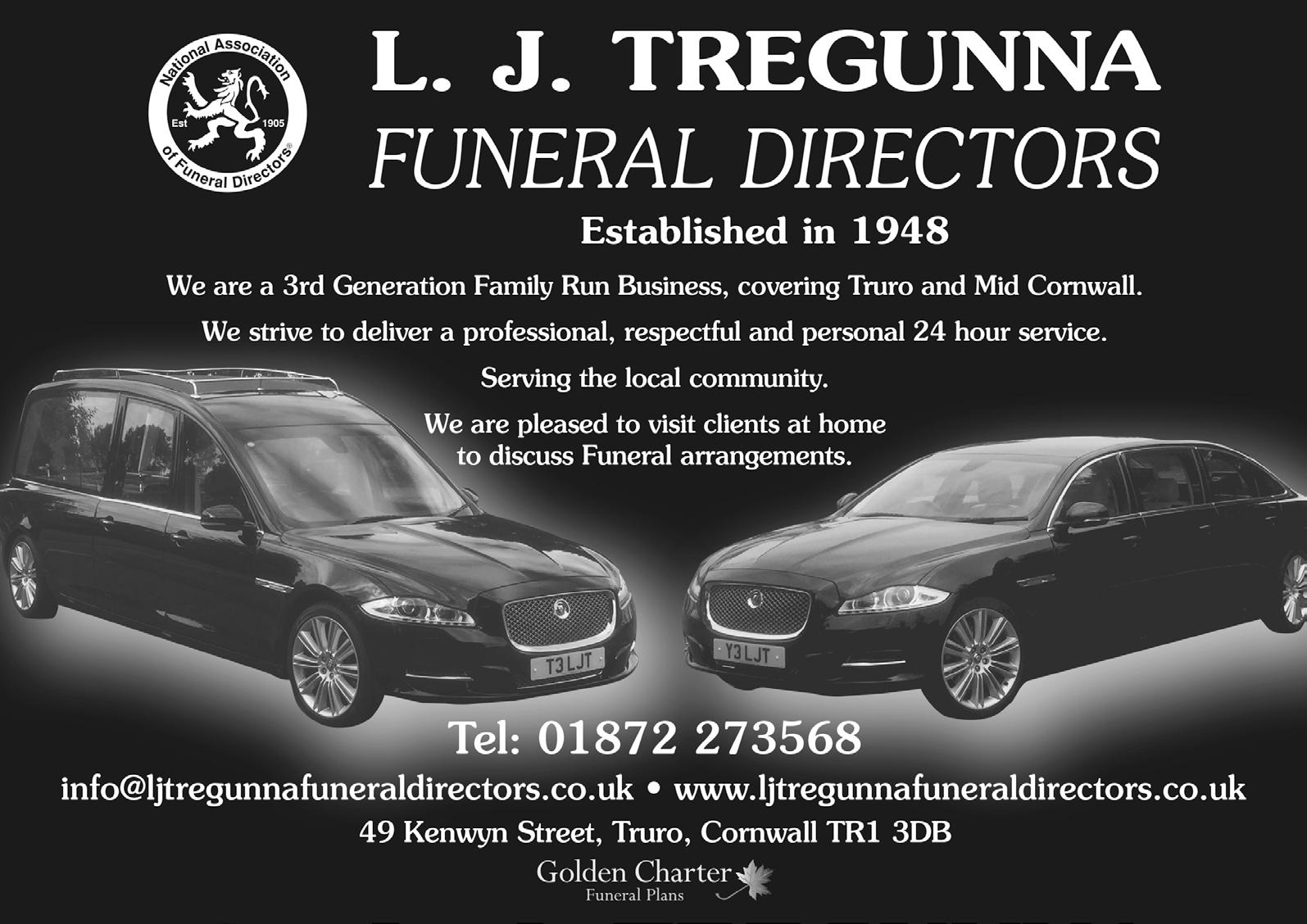
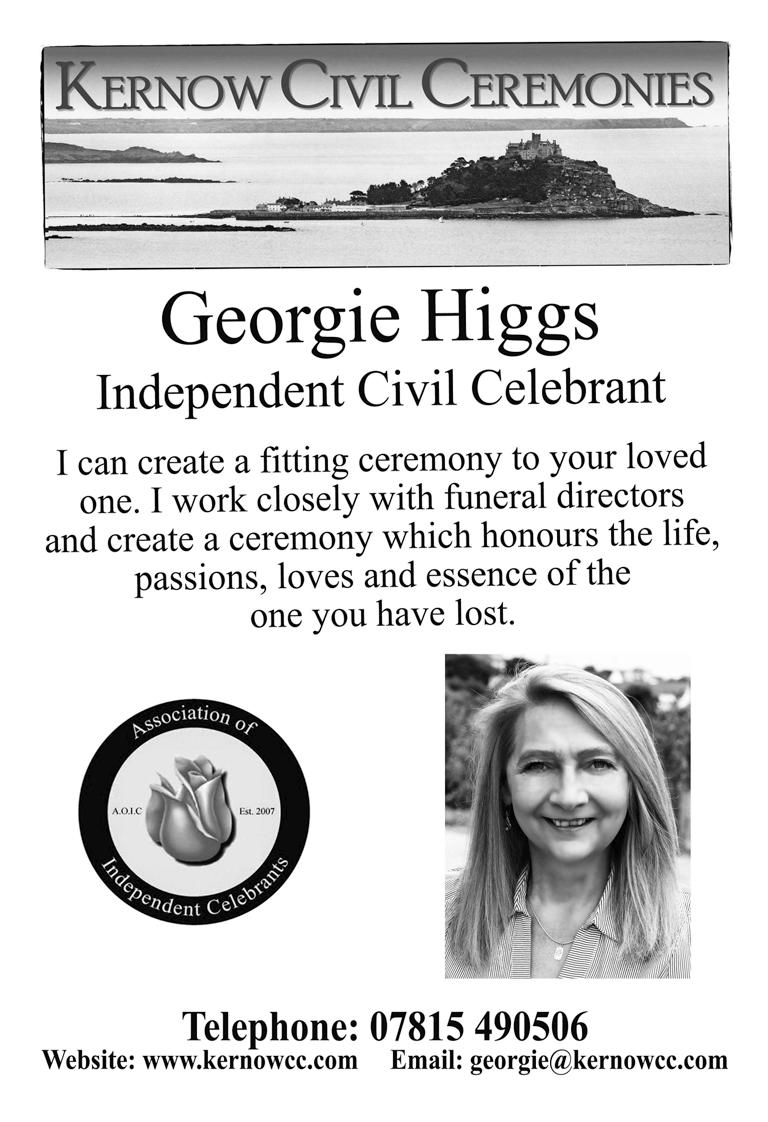



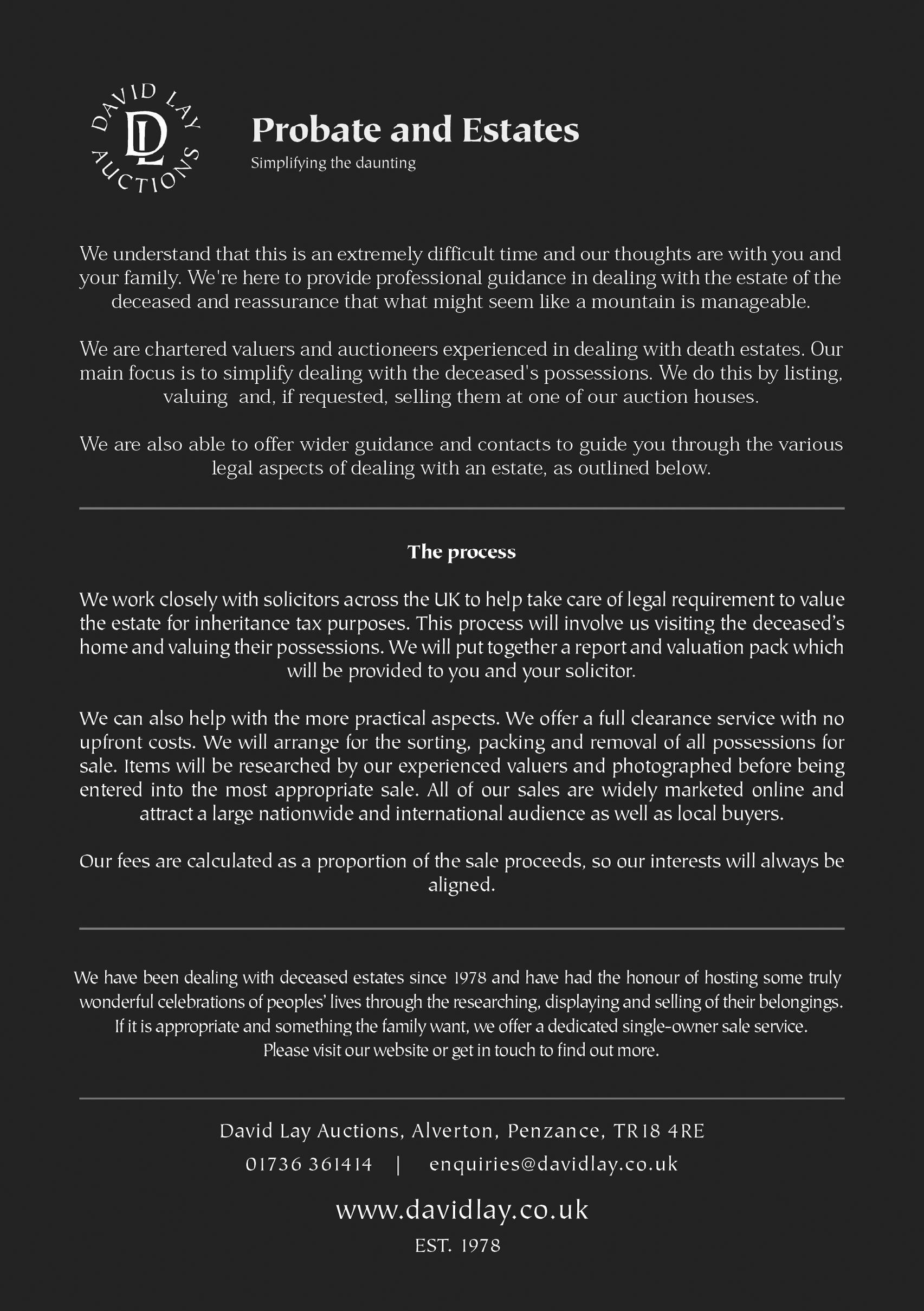

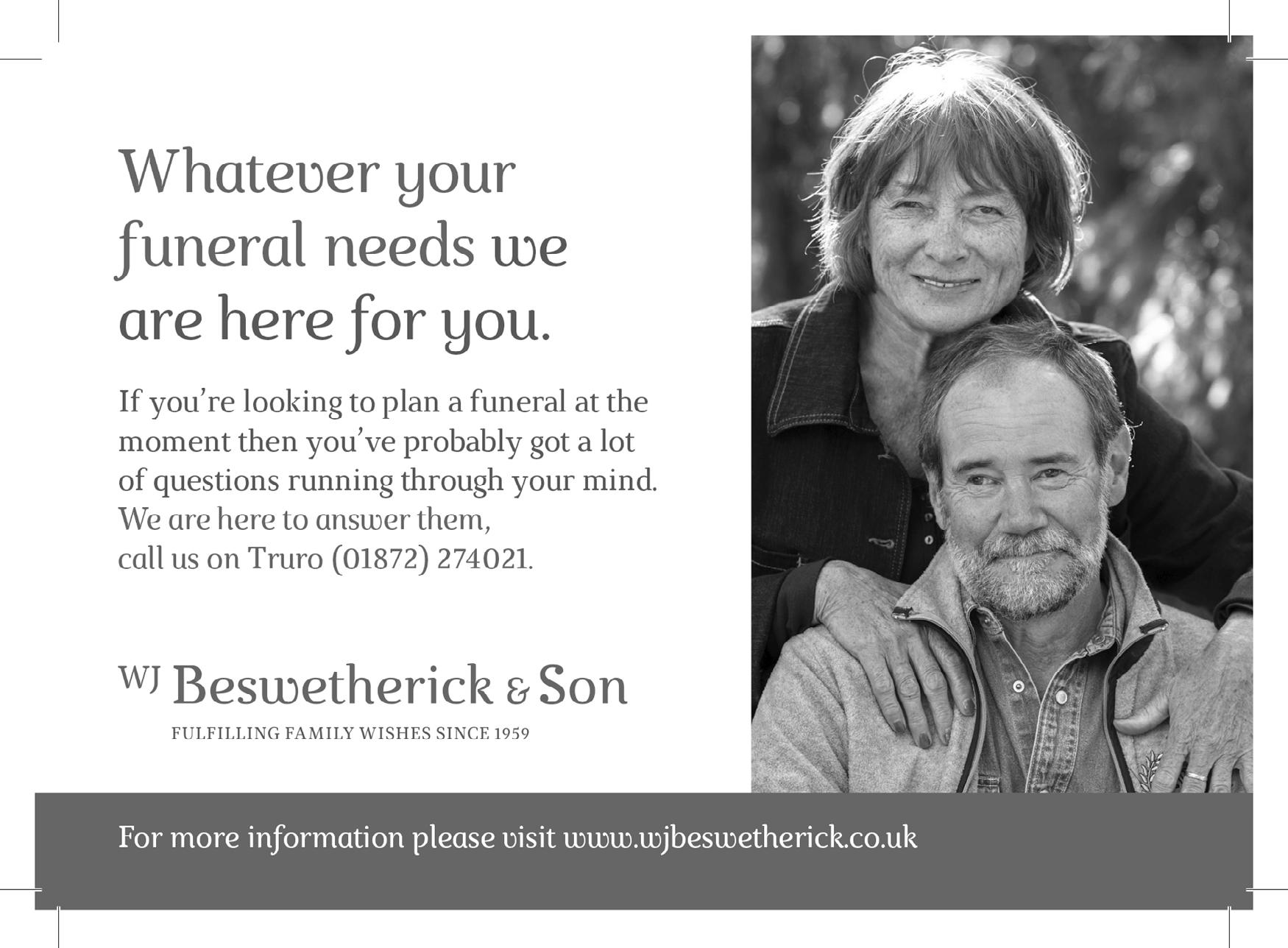
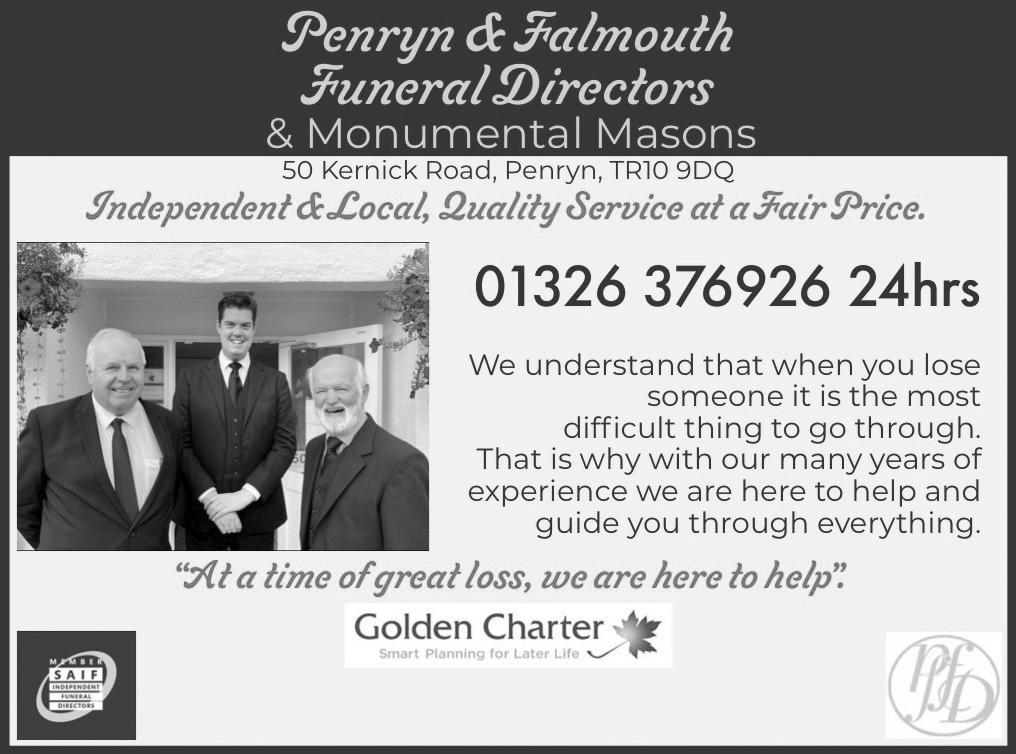
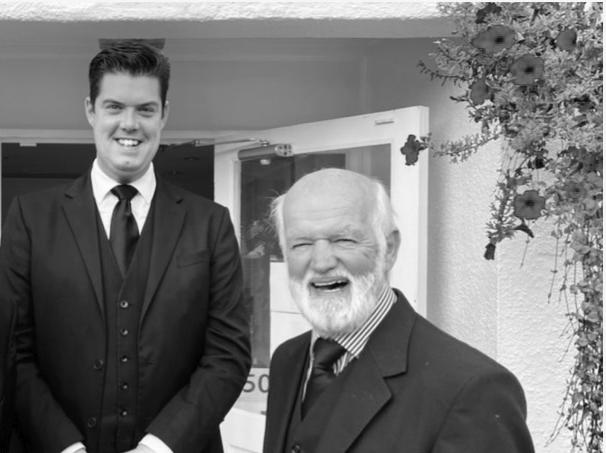
Facebook: Penryn & Falmouth Funeral Directors www.penrynandfalmouthfuneraldirectors.com
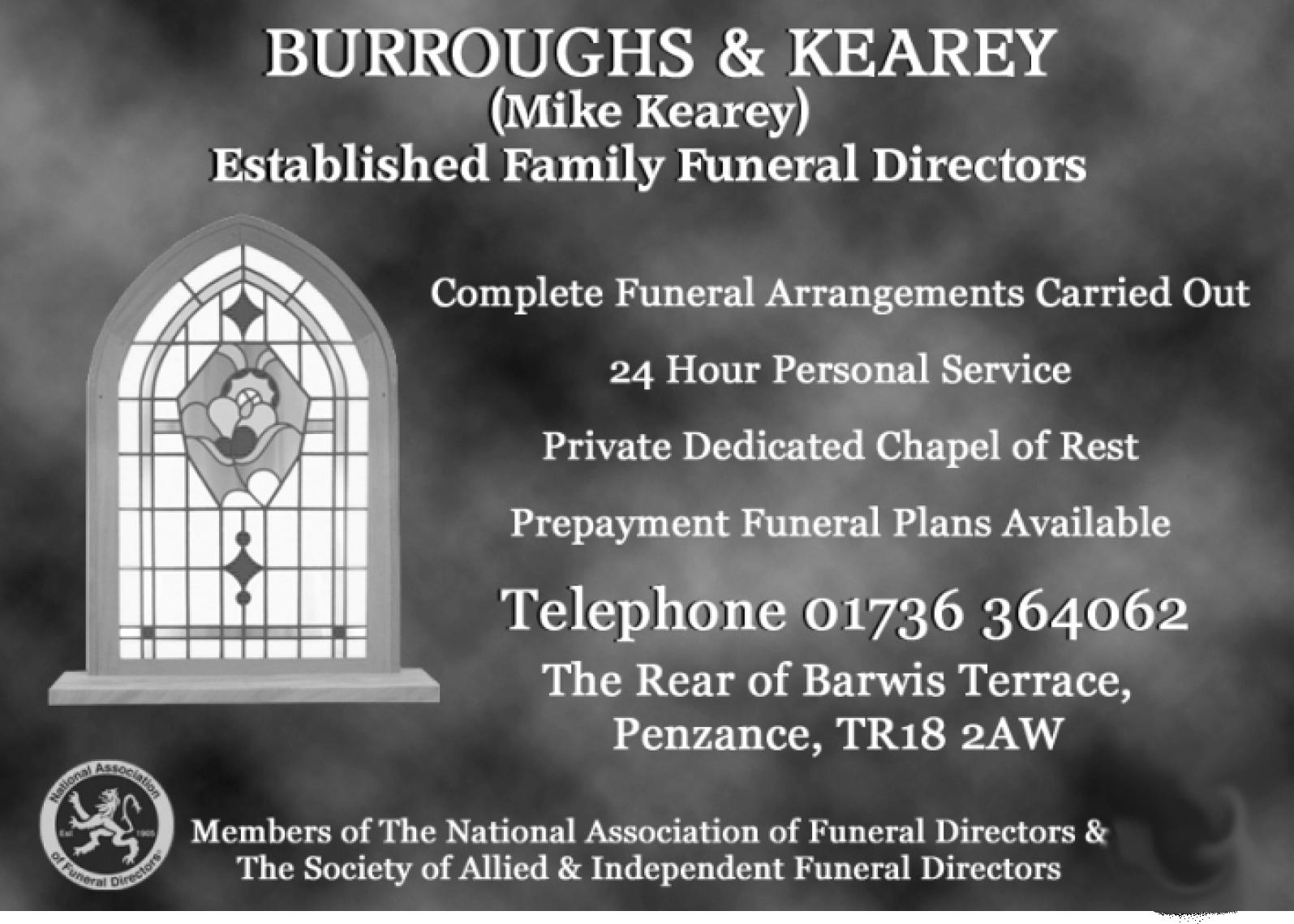
Published by RNS Publications © Tel: 01253 832400 R3
















